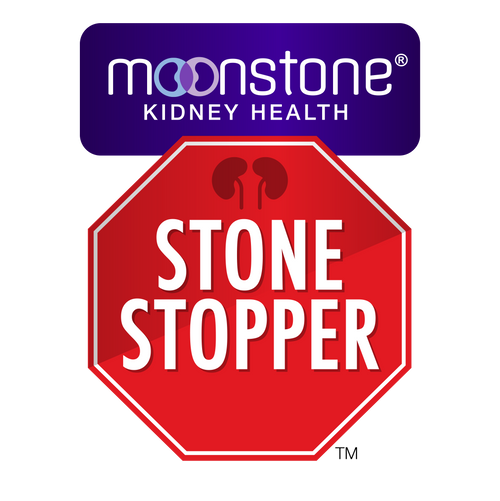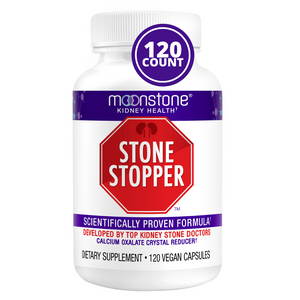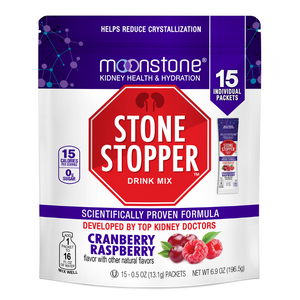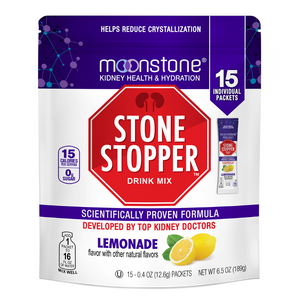The ketogenic diet is a low-carb, high-fat diet commonly used for weight loss. It is also used in therapy for epilepsy in children. While there are legions of keto diet fans who rave about the benefits, there still is a darker side to this very restrictive diet regime. Namely, the increasing prevalence of kidney stones.
The Link Between the Keto Diet & Kidney Stones
“The keto diet produces acidosis, so the major effect is expected to be a reduction in urine citrate." said leading nephrologist Dr. David Goldfarb MD. He continued, “It will also probably increase the amount of uric acid in the urine. The acidosis will probably increase the amount of calcium too.”
When we asked David for his thoughts on the keto diet, he explained the facts like this:
“As the keto diet is very high in animal protein, this will increase the amount of uric acid in the urine which can promote both uric acid stones as well as increased risk for calcium oxalate stones. The increased protein also causes an acid load for the kidneys and promotes bone absorption. The increased acid load will decrease citrate in the urine.”
From his feedback, the connection between keto and kidney stones seems pretty straightforward. Keto does increase your risk of kidney stones. Now, while we’ve talked about the right diet for kidney stone prevention before, we’ve never deeply explored diets that aren’t right for kidney stone prevention. After receiving a ton of messages on social media about the keto/kidney stone connection, we decided to dig a little deeper.
Keto & Kidney Stone Research
According to a study published in June of 2021, the estimated incidence of kidney stones in patients on ketogenic diets is 5.9%. Incidence is approximately 5.8% in children and 7.9% in adults. This study, conducted by a team of diverse doctors, focused on a total of 36 studies with 2795 patients on ketogenic diets. The patients enrolled were tracked for two years. The data overwhelmingly showed that uric acid stones were the most prevalent kidney stones in patients on ketogenic diets, followed by calcium-based stones.
What is keto?
For those of you who don’t know, the keto diet was developed in 1923 at the Mayo Clinic as a treatment for epilepsy. (And it still is.) Today the keto diet has been studied for many conditions. These include Alzheimer’s dementia, cognitive decline, heart disease, Polycystic Ovarian Syndrome (PCOS), and acne. In many cases, the keto diet showed some success, especially for those struggling with obesity.
For those looking to lose significant weight, keto is often thought of as a miracle cure. (Who doesn’t love stuff wrapped in bacon, right?) But the current mainstream keto diet is high in fat and protein and very low in carbohydrates. Consequently, it can have a negative effect on our long-term health.
Without carbohydrates, our body doesn’t have its preferred source of energy, glucose. When we limit our carbohydrate intake, our body produces ketones to use for energy in place of glucose.
Registered dietician Melanie Betz, the face behind the successful Kidney Stone Dietician blog, has a very comprehensive review of this process. Betz also explains the difference between the modern keto and the classical keto diet commonly used for epilepsy treatment.
She talks about how the keto diet has been, “somewhat hijacked by diet culture”. Also, how “true keto diet only has about 4% of calories from carbohydrates and limits protein.”
She goes on to explain that a keto diet, regardless of modern or classical, is very different from what nutritionists recommend for kidney stone prevention and maintenance. (As showcased in the graph below from thekidneydietician.org website).
How to do Keto Safely for Kidney Stones
From our research, it seems that a keto diet that places too much emphasis on fat, salt, and animal protein. It also limits calcium from dairy, fruits, and vegetables. This will likely increase your risk of forming kidney stones at some point.
So what to do?
We suggest looking to a more plant-based diet and avoiding high oxalate foods that are known to increase your risk of kidney stone development. However, if your doctor has suggested adopting a keto diet for weight loss or another medical condition, we recommend also investing in an alkali citrate supplement. Moonstone Stone Stopper™ can help counterbalance the potential stress on your kidneys.
At the same time, it’s very important to increase your hydration and fluid intake. The more you drink, the more you pee, making the risk of kidney stone development less likely.
You should also eat as many low-carb vegetables as possible while limiting your salt intake to no more than 2,300 mg per day.
If you are a person dealing with chronic kidney disease (CKD), you should most likely avoid a keto diet altogether. CKD patients have weakened kidneys that may be unable to remove the acid buildup in the blood that comes from too much animal meat consumption. This can lead to a state of acidosis, which can worsen the progression of CKD.
As always, we suggest consulting with your medical doctor and/or nutritionist to find the right diet for your specific kidney stone needs. Depending on the kind of kidney stone you have, you may have an altered diet recommendation. A skilled doctor will likely review a 24-hour urine test to better understand your unique situation when choosing to adopt any lifestyle changes.







5 comments
Hi moonstonenutrition.com Owner.
To the moonstonenutrition.com Admin.
Dear moonstonenutrition.com Webmaster, very same below: Link Text